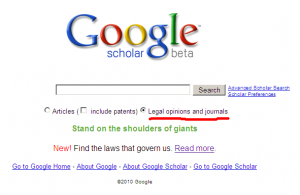Announcement last night on the Official Google Blog:
Today we’re excited to announce Google Ventures, Google’s new venture capital fund.
…
At its core, Google Ventures is charged with finding and helping to develop exceptional start-ups. We’ll be focusing on early stage investments across a diverse range of industries, including consumer Internet, software, clean-tech, bio-tech, health care and, no doubt, other areas we haven’t thought of yet.
Perhaps not a surprise, as there were reports (like this one in the WSJ) in mid-2008 that this was in the works. So far, it seems reactions are mixed – not necessarily to Google Ventures per se but to corporate VCs in general. The WSJ had this to say:
Their track records have been mixed. Corporate venture-capital arms have been hampered by challenges that traditional venture-capital businesses don’t face. Venture capitalists invest in private start-ups at an early stage, usually in hopes of a big payout if the company is sold or if its stock goes public.
Many start-ups fear that taking corporate money limits their options and comes with strings that could turn away other potential investors — such as a right to buy the company at a later date. Some funds with less competitive compensation have struggled to retain managers, and corporate venture funds often don’t allow senior employees to invest personal money in their funds, while other venture funds typically do.
This is also echoed by some traditional VCs, including Fred Wilson of Union Square Ventures (who by the way writes a great blog – highly recommended) who concluded in his post:
But I do think that venture investing is not the best use of a corporation’s capital and that it is inevitable that it will produce sub-par returns at best and significant losses at worst.
He cites the same reasons above in the WSJ article and also suggests that corporate VCs will have difficulty retaining talented fund management.
Corporate VCs, like strategic purchasers in M&A deals, may have longer term strategic objectives that, over a longer term, will result in benefits to them. In this regard, corporate VCs can be likened to some extent to strategic purchasers in an M&A context (while traditional VCs can be liked more to financial purchasers). In this regard, one of the advantages of corporate VCs to investees is that they will often have a longer term view of their investment than their traditional VC counterparts – they won’t be under the same constraints to book gains and make their LPs happy or to meet the horizon of their fund. In this case, the very thing that Fred suggests is a weakness of corporate VCs could well be an advantage to an investee company, depending of course on the objectives of the investee.
For the same reason, I’m not sure if it would be valid to say that corporate VCs are or are likelier to (as compared with traditional VCs) fail, because if the focus is on longer term objectives, realized profits as reported on the corporate VC’s income statement might not accurately reflect the actual benefit. At the simplest level, it could allow a company like Google, which has traditionally simply acquired companies that interest it outright, to hedge it’s bets. If the company is wildly successful, and Google wants to buy it outright, it will have saved a few dollars by having put in money at an earlier stage (and presumably much lower valuations). Depending on how things are structured and accounted for, I’m not sure whether the savings in that situation would necessarily be reflected in the measured earnings of the corporate VC. But apart from actual savings, VC investing will also allow Google to gain an insider’s perspective on its investees at an earlier stage and to better assess how things are coming along, and to help them along. This itself may be worthwhile relative to the costs associated with researching potential acquisition targets at a later stage.
I’m not suggesting that in all cases Google will be using Google Ventures as a farm team for potential acquisitions. But even if it isn’t, it may well develop better and deeper relationships with entrepreneurial companies that it could later partner with or enter into some sort of strategic relationship that will enable it to realize financial benefits going beyond those measured in the VC arm’s financials. And it will be better positioned to do so as an investor in the company.
Not to say that life with corporate VCs is all wine and roses. There are often thorny issues to deal with, particularly when it comes to commercial dealings between an investee and an investor, as Fred notes, and things like purchase options (which I’ve seen proposed a few times and for which the answer is a relatively consistent “no” from investees).
All that being said, an article in Wired suggests Google Ventures will act more like a traditional VC:
The fund, to be called Google Ventures, will be wholly owned by Google, but will operate as a separate entity and will seek investment opportunities to maximize returns rather than looking for investments that strictly fit with Google’s strategic vision.
…
Several high-tech companies have in-house venture capital arms, including Intel and Motorola, But Maris said that Google Ventures will have more in common with traditional venture capital firms.
“We’re making financial return our first lens,” said Maris. But he noted that a part of the appeal of Google Ventures for start-up firms is the relationship to Google and its 20,000 employees.
Interesting. I guess we’ll see. In the meantime, if you’re looking for financing, go to the Google Ventures site.

